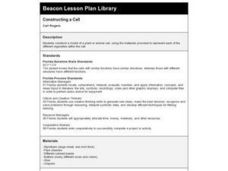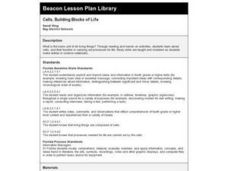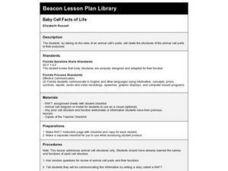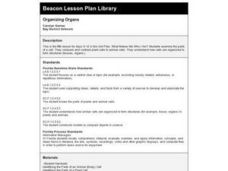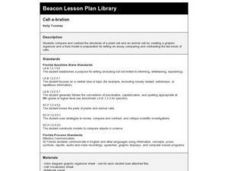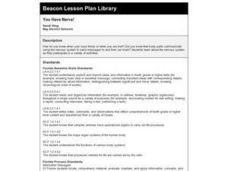Curated OER
Those Cells Look Good Enough to Eat
Students explore the parts of the cell. In this cell lesson, students use foods to create cell models that represent the nucleus, cytoplasm, cell membrane, mitochondria, ribosomes, vacuoles, endoplasmic reticulum, and Golgi bodies...
Curated OER
Cell Factory
Young scholars examine the basic structures and functions of cells. They design and construct a factory cell model where each factory part corresponds to a cell part.
Curated OER
Constructing a Cell
Third graders, in groups, make a model of a plant or animal cells and represent each of the organelles in the cell.
Alabama Learning Exchange
Edible Cell
Students identify cell parts and their function. In this animal cell lesson, students view a video clip and discuss cell components. Students create an edible replica of an animal cell using food items.
Curated OER
Cells and Organelles
Students define the parts of a cell and make a model. In this cells and organelles lesson, students construct organelles from supplied materials. Students describe the parts of their constructions.
Curated OER
Cells in the Making
Young scholars examine and research the parts of a cell, their functions, and life processes. They simulate how cells receive nutrients using coffee filters, water, and coffee, and construct cells using pudding, cookie dough, and candy.
Curated OER
Cells, Building Blocks of Life
Fourth graders, in groups, explore cells, the basic unit of all living things.
Curated OER
Edible Cells
Eighth graders construct edible models of a plant cell and an animal cell and state the functions of the organelles. They are to write a short sentence describing the function of each organelle.
Curated OER
Baby Cell Facts of Life
Students examine the roles of an animal cell's parts, how each part relates to one another and then demonstrate their knowledge by writing a story about the animal cell structure.
Curated OER
Cell Community
Seventh graders use technology to review cell structure and function. In this cells less, 7th graders review the parts and functions of a cell, and use photography/video and PowerPoint to enhance their explorations.
Curated OER
Organizing Organs
Fifth graders research plant and animals cells and create a Venn Diagram to show the similarities and differences.
Curated OER
Cell-a-bration
Fifth graders study the structures of a plant cell and animal cell. They create a graphic organizer and a food model. Finally, they write an essay comparing and contrasting plant and animal cells.
Curated OER
Schools and Cells
Fourth graders create analogies in poster format between a cell's organelles and their school. For example, 4th graders coul say a cell's mitochondria is like the cafeteria, both are a source of energy.
Curated OER
Pump It Up!
Students design a pumping device that will effectively pump fluid through a model "cardiovascular system." They explore the effects of too much and too little pressure on a circulatory system.
Curated OER
I Need Air
Learners examine and research the organs of the respiratory system. They participate in a vocabulary card matching game, create a graphic organizer, and participate in an experiment titled, Floating on Air.
Curated OER
Feed Your Cells
Students examine and research the human digestive system and what happens to the food we eat. They read the article, The Passage of Food, participate in an experiment with crackers, and write a paragraph summarizing the function of the...
Curated OER
Do You Know the Master Programmer?
Fourth graders, using candy, build models of DNA replication, RNA transcription, and tRNA translation.
Curated OER
Cardiac Maze
Students participate in a role-play activity to lean about red and white blood cells, veins, capillaries and arteries. They also see how blood passes through the heart, lungs and out of the body, carrying oxygen and nutrients.
Curated OER
The Making of an Organ
Students examine and research how cells make up our organs. They create a model of a tongue showing cells, tissues and the organ.
Curated OER
Toothpick Breakdown
Fourth graders model the activity of an enzyme acting on a substrate and observe relationships. Have students place toothpicks in a pile. One member of the team should break as many toothpicks as possible, in 10 seconds.
Curated OER
What a Waste!
Fourth graders explore the kidney, bladder, and function of the excretory (urinary) system.
Curated OER
The Skeleton Within
Fourth graders explore the bones, joints, and other attributes of the skeletal system.
Curated OER
You Have Nerve!
Fourth graders investigate the nervous system and how it communicates messages to and from the brain.


